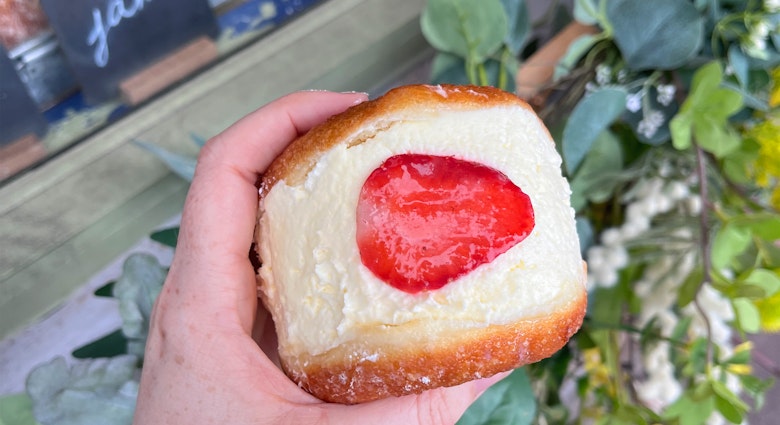

Some Latin American snacks get all the glory. Whether you’re backpacking through Central America or swinging by your local food truck, you hear people rhapsodizing about Colombian arepas and Salvadorean pupusas, Mexican gorditas and Guatemalan tamales and Argentinian empanadas – but when have you heard anyone mention the Nicaraguan quesillo? Or the nacatamal? Or ±ąľ±˛µ´Ç°ůĂł˛Ô?

Indeed, Nicaraguan food is one of those rare cuisines that hardly exists outside national borders – good luck finding a Nicaraguan restaurant in New York or London – and even when you’re in the country, the local food scene can be confusing. It’s lunchtime in Granada’s central plaza, and a trio of apron-wearing ladies are serving food from beat-up metal pots and large plastic buckets. Industrial buckets, the kind house painters carry, the kind you’d mix cement in. What exactly is in that bucket, you think to yourself, and do I dare try it? Yes, you do. You must.
What follows is a basic guide to experiencing Nicaraguan food like a local. A few words of wisdom: you’ll want to know the difference between maduros and tajadas. Don’t be shy about sipping that fruit juice Nica-style out of a plastic bag with a straw. And don’t make a fool of yourself by biting into that plantain leaf: it’s just packaging for the main dish.
Desayuno nicaragĂĽense (Nicaraguan breakfast)
You won’t have to try very hard to experience the classic desayuno nicaragüense. Simply roll out of bed and pull up a chair at the breakfast table: the meal is included at nearly every hotel, guesthouse and hostel in the country. The standard breakfast features two eggs (scrambled or fried, sometimes you get to choose), a scoop of gallo pinto (rice and beans Nicaraguan-style, fried with onion, sweet pepper, and garlic), and a slice of soft Nicaraguan cheese. The cheese is, admittedly, something of an acquired taste, but its salty flavor pairs nicely with the eggs. At nicer hotels and cafes, breakfast comes with fruit and freshly squeezed juice, or sometimes with a homemade tortilla and spicy pico de gallo – essentially a Nicaraguan version of breakfast tacos. If you happen to be out and about on a Sunday morning, look for nacatamales, the Nicaraguan tamale that is stuffed with pork, cornmeal, vegetables and rice, all wrapped up in a plantain leaf. These tasty treats are usually sold out of people's houses and served with black coffee.

A cup of strong, hot coffee is compulsory, of course, and chances are those beans were harvested nearby: coffee is Nicaragua’s principal export to the rest of the world. If you’re serious about coffee, find a cafe like in ł˘±đĂł˛Ô, which sources its 100% organic beans from an ecological farm in the region, or the Cornerhouse on the island of Ometepe, where the beans are grown on the side of the nearby Maderas volcano, then roasted in a clay pot over an open fire. Of course, the coffee shop is not exactly a Nicaraguan concept – these places attract more travelers than locals – but it’s worth the trade off to sample a cup of well-prepared Nicaraguan coffee.
Lunch and street snacks
To lunch like a local, pop into a comedor, a no-frills eatery offering one or two set plates at midday, and ask for the plato del dĂa (daily special). You’ll find variations on the same meal pretty much everywhere in Nicaragua: roasted chicken or beef (or fish, if you’re near a lake or the ocean) with plantains, curtido (chopped cabbage salad) and, of course, a side of gallo pinto.
What are some other traditional dishes you might spot as a lunchtime special at hole-in-the-wall restaurants throughout Nicaragua, you ask? There’s indio viejo, a hearty corn-based stew consisting of shredded beef, onions, tomatoes, and peppers (and, somewhat surprisingly, fresh mint and the juice of a bitter orange). The name indio viejo means 'old Indian' – the recipe dates back to Nicaragua’s pre-Columbian past. And then there’s ±ąľ±˛µ´Ç°ůĂł˛Ô, a classic 'fast food' option featuring boiled cassava, curtido and chicharrones (deep-fried pork rinds). The dish was born in Granada, and the food kiosks in the city’s parque central (central plaza) are still a great place to try it.

This brings us to another lunchtime option: street food. Staples to look for include tajadas, or deep-fried plantain chips, and the quesillo. Think of it as the Nicaraguan version of the Mexican quesadilla: in this case, a thick corn tortilla stuffed with soft cheese, pickled onions and vinegar, then rolled up like a burrito and topped with a dollop of cream. Probably the most popular place to sample the quesillo is at , the food stand that claims to have invented the snack back in 1977. It’s located outside of ł˘±đĂł˛Ô, in the town of La Paz Centro, but you’ll also find quesillos being prepared at rickety outdoor tables at bus stations, plazas, gas stations, and roadsides all over Nicaragua.
Wash it all down with fresco – in Nicaragua, the term usually refers to juice, not soda. These vendors can be tricky to spot on the street, as they usually don’t have signs. Just look for the ladies sitting beside large buckets or plastic containers with long-handled ladles or listen for a voice shouting 'fresco, fresco, fresco'. What’s in that bucket? Glorious refreshment: colorful juices, including tropical jamaica (hibiscus) and tamarindo (tamarind), and more adventurous options like chicha and cebada, based, respectively, in corn and barley. The ladies pour your juice of choice into a small plastic bag filled partway with ice, then fasten the bag around a straw – it’s the perfect takeaway beverage on a hot afternoon.

Navigating the fritanga
When the sun goes down in any town in Nicaragua, you’ll notice plumes of smoke billowing up into the evening air. Follow the signal to the fritanga, a casual dinnertime establishment that’s set up around a simple outdoor grill. If you don’t speak Spanish you can point to what you want, but generally you choose between carne asada (grilled steak) and pollo (chicken), and then again between tajadas (savory plantain chips) and maduros (sautéed sweet plantains). Gallo pinto and curtido – typically served from large buckets, naturally – top off each plate. Pull up a plastic chair or get your meal to-go, wrapped in a giant plantain leaf. A good place to try: the hugely popular in the Pacific surf town of San Juan del Sur.
With a dinner like this, you’ll be well-prepared for the rest of the evening, which will inevitably feature cold and free-flowing Toña beer and rum cocktails made with the national brand, Flor de Caña. A day of food and drink, Nica-style: enjoy it while you’re here, because you probably won’t find it anywhere else.
Explore related stories







 BeachesMartha's Vineyard vs Nantucket: which dreamy Massachusetts island is better?
BeachesMartha's Vineyard vs Nantucket: which dreamy Massachusetts island is better?Jun 4, 2024 • 7 min read
 Food and DrinkI’ve been to nearly every rooftop bar in NYC. These are the best for summer 2024
Food and DrinkI’ve been to nearly every rooftop bar in NYC. These are the best for summer 2024May 16, 2024 • 8 min read

